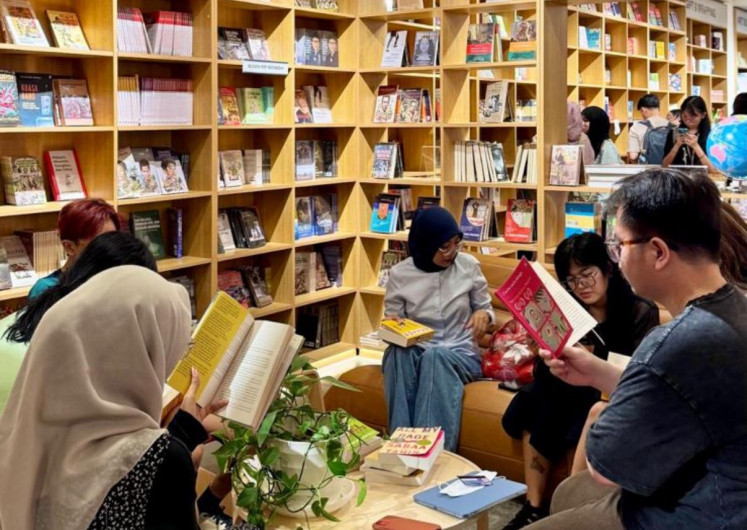Popular Reads
Top Results
Can't find what you're looking for?
View all search resultsPopular Reads
Top Results
Can't find what you're looking for?
View all search resultsMust different political choices lead to heartbreak?
Political discussions can turn personal, antagonizing loved ones.
Change text size
Gift Premium Articles
to Anyone
T
he 2024 presidential election may have passed, but deep divisions continue to linger among couples who voted for different candidates. Voters had three options, politically, or they could simply choose to abstain.
Political noise from social media inevitably seeps into relationships, potentially wreaking marital division. Nisa, 24, experienced this first-hand with her husband.
Nisa knew all along who her husband was voting for, which was Prabowo and Gibran Rakabuming Raka. But since Nisa maintained the principle of luber jurdil (direct, public, free, secret, honest and fair), she declined to reveal her choice until election day.
Her husband was disappointed when he learned Nisa’s choice was for Anies Baswedan and Muhaimin Iskandar.
“Our relationship was good and calm,” said Nisa. “But after I told him my candidate of choice, my husband gave me the silent treatment, acted indifferently, and spent a lot of time on the phone.”
For her husband, Anies and Muhaimin were only good for talking and presenting data, without producing any real results.
He was convinced that Prabowo and Gibran, who would continue the new capital city project in East Kalimantan, represented a different approach. Since the couple lives in that province, Nisa’s husband hoped that choosing Prabowo would mean more prosperity for people in East Kalimantan.
Nisa's experience illustrates how different political choices can be a challenge, but how far can this put a strain on relationships?
Tolerating difference
Couples therapist Tasha Seiter, from Psychology Today, points out that problems may emerge when partners attempt to change each other’s political views.
Nisa discovered this the hard way. She hoped her husband would change his mind, as she would ultimately accept his choices. Nisa tried to persuade him by showing other candidates’ manifestos, and their track records when holding office.
"I told my husband not to choose a candidate just because it’s trending on TikTok," said Nisa. "But my husband was ‘hypnotized’ by [Prabowo’s] cute tricks and dancing gestures. He didn't look at [the candidate’s] vision and mission."
According to Seiter, It is important to choose someone with similar political views, because our political views reflect our values, principles and beliefs. It goes beyond a candidate’s vision to improve the country.
Rani, a writer and journalist, considers political views to be a fundamental factor in a relationship. In 2017, Rani’s romantic relationship ended partly because her ex-boyfriend voted for Anies Baswedan and Sandiaga Uno in the 2017 Jakarta gubernatorial election.
“It's not just a matter of differences in political choices. Values were undermined because of Anies' political games. How could my ex-boyfriend support that?” asked Rani.
At that time, Anies and Sandi leaned on Islamic identity politics to win votes. Supporters were split into two camps based on the religious identities that resonated with them. Many Jakarta residents who were Muslims voted for Anies, while those who were Christians or ethnic Chinese mainly voted for Basuki “Ahok” Tjahaja Purnama and Djarot Saiful Hidayat.
For Rani, this campaign strategy destroyed religious harmony. Religious matters should remain private, not a subject for public debate.
Rani’s ex-boyfriend defended his choice, arguing that the use of identity politics was a common strategy. Ahok and Djarot were no more innocent in this regard, he said. As each of them tried to influence the other, Rani discovered that her attempts fell flat. She withdrew from the relationship, knowing there were irreconcilable differences between them.
“People's political choices don’t emerge out of nowhere,” said Rani. “Our choice doesn’t come from simple reasoning. It reflects our worldview and ideology.”
However, ending the relationship over political differences is not the only way out. How, then, can couples bridge this gap and find common ground?
Know your values
In an interview with TODAY, marriage therapists Danielle Moye and Dana McNeil emphasized the importance of recognizing the values that bind you together as a couple, despite differing political views.
First, understand the values that hold the relationship together. When discussing political choices, it is important to keep in mind the higher goals that couples want to achieve. This helps dampen the explosive nature of political debates. In fact, the couple might discover more similarities and shared values between them.
Second, show curiosity. Instead of expressing disappointment in your partner’s choices, ask them about their reasoning, and truly listen to them.
Third, communicate about any topics that might be more sensitive to discuss. Ask for space so you can feel safe when bringing up more sensitive topics. If you are the person on the other end, practice active listening. Refrain from giving reactionary responses. Build understanding with your partner.
Fourth, use the word “I” to emphasize the importance of certain political views. This communicates to the other person that you have personal reasons for supporting a certain candidate. For example, say: "I won’t vote for that candidate because they don’t support rights for women and sexual minorities.” The hope is that your partner understands how your choice is heavily impacted by your personal experience.
Fifth, accept that you cannot change your partner's mind. Similar to Seiter, McNeil believes that attempting to convince the other to change their mind is a waste of effort, especially if you do not understand the significance of their political choice in their personal lives.
Sixth, identify the values on which you cannot compromise. After understanding each other’s perspective, consider whether the relationship can be sustained despite the political differences. If you decide to continue the relationship, accept the fact that these differences will persist beyond the election period, and might emerge as an issue at different times.
---
This article was originally published in Indonesian in Magdalene, an online magazine that educates, empowers and pushes for a more equal society through solution-driven journalism.











